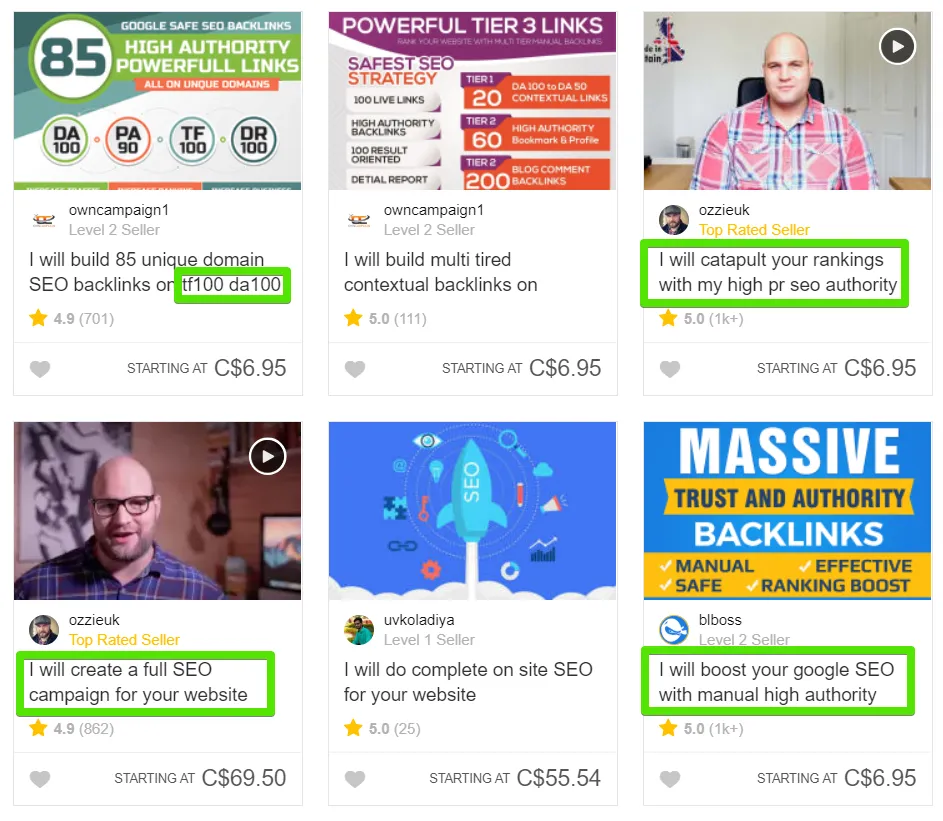In the ever-changing landscape of online freelancing, gig swapping has emerged as a hot topic among Fiverr users. But what exactly does it mean, and is it a risky endeavor? In this blog post, we'll delve into the details of gig swapping, discuss its implications, and explore whether engaging in this practice could potentially lead to a ban from Fiverr.
What is Gig Swapping?

Gig swapping is a term that refers to the practice of freelancers exchanging services with each other on platforms like Fiverr. In simpler terms, it’s when two or more sellers agree to purchase each other’s gigs, often with the intention of boosting reviews, rankings, or overall visibility. While this may sound like a harmless strategy to gain credibility, it raises some important questions about the ethics of the practice.
Here’s a breakdown of what gig swapping usually entails:
- Mutual Benefit: Freelancers help each other by providing services that they would otherwise buy from a client. For example, a graphic designer may create a logo for a writer who, in return, writes an article for the designer.
- Improved Ratings: By purchasing gigs from each other, freelancers can quickly accumulate positive reviews, which can significantly enhance their profile attractiveness.
- Visibility Boost: Higher rankings and better ratings on Fiverr can lead to more exposure and potential clients knocking at the door.
However, the allure of gig swapping brings with it some serious considerations. Fiverr's terms of service prohibit certain behaviors that could be perceived as gaming the system. Engaging in gig swapping may lead to:
| Potential Risks | Consequences |
|---|---|
| Violation of Terms of Service | Possible account suspension or ban |
| Loss of Genuine Client Trust | Harmed reputation and long-term earnings |
In summary, while gig swapping may seem like an enticing shortcut to success on Fiverr, it’s essential to weigh the potential risks against the benefits. Engaging in this practice could lead to unintended consequences, making it crucial for freelancers to tread carefully.
Also Read This: How to Upload a Video on Fiverr
Understanding Fiverr's Terms of Service

When it comes to using Fiverr, it's essential to familiarize yourself with their Terms of Service. These guidelines are your roadmap to understanding what is allowed on the platform and what isn’t. Simply put, Fiverr's Terms of Service help ensure a safe and secure environment for both buyers and sellers.
One crucial point in the Terms of Service is the section on account sharing or switching gigs. Fiverr strictly prohibits users from swapping gigs, which means that if you create a gig and share it with someone else or take on someone else's gig in exchange, you could be violating their policies. This is because gig swapping compromises the trust and integrity of the marketplace.
To give you a clearer picture, here are some specific areas covered under Fiverr’s Terms of Service:
- Account Ownership: Each account must be unique to the user. Sharing account information with others can lead to account suspension.
- Commission Fees: When you swap gigs, it often involves negotiating fee structures that Fiverr hasn’t authorized, which goes against their policies.
- Quality Control: Fiverr emphasizes quality in its services. Gig swapping can dilute the quality and authenticity of the work being provided.
Ultimately, a solid understanding of Fiverr’s Terms of Service not only helps you avoid potential pitfalls but also fosters a professional environment that encourages fair treatment for everyone involved.
Also Read This: Launching Your Freelance Accounting Career
Potential Consequences of Gig Swapping

Now that we've discussed the importance of Fiverr's Terms of Service, it’s vital to understand the potential consequences of gig swapping. While it might seem harmless to pass gigs back and forth with friends, the risks are far too significant to overlook.
- Account Suspension: If Fiverr catches on to any gig swapping practices, they could suspend your account indefinitely. This means you could lose all your hard-earned gigs and revenue.
- Loss of Reputation: Gig swapping can tarnish your reputation on the platform, making it hard to recover. Buyers look for consistency and integrity, and any breach of trust can result in negative reviews or loss of client relationships.
- Financial Penalties: In some cases, Fiverr may impose fines or require you to forfeit your earnings if they determine that you've engaged in illicit activity.
- Legal Implications: Depending on the severity of the violation, there may be legal repercussions which could lead to extra complications for you as a seller.
In summary, while the allure of gig swapping might seem tempting, especially for those looking to expand their portfolio or boost their income, the risks far outweigh the rewards. It’s best to adhere to Fiverr's guidelines, build your own gigs, and maintain your integrity within the Fiverr community.
Also Read This: Can You Make Money on Fiverr as a Web Developer?
5. How Fiverr Detects Gig Swapping

Gig swapping, or trading reviews and gigs with other sellers, is something Fiverr actively works to detect. But how do they do this? Here’s a closer look at some of the techniques Fiverr employs to spot this behavior:
- Account Monitoring: Fiverr has sophisticated algorithms that monitor accounts for unusual activities, such as sudden spikes in orders, frequent gig alterations, or rapid changes in seller behavior.
- Review Patterns: If multiple sellers receive reviews that are suspiciously similar, or if reviews seem to come in from the same IP address, Fiverr takes notice.
- Seller Relationships: Fiverr analyzes connections between sellers. If two accounts are frequently trading gigs or reviews, this might raise red flags.
- Feedback Consistency: A typical review pattern would reflect the diversity of buyer experiences. If one seller’s feedback is consistently glowing and comes on the heels of trading gigs, this may look fishy.
So, if you’re thinking about gig swapping, it’s crucial to understand that Fiverr has ways to catch on. The risk of getting banned is quite real, and it’s simply not worth jeopardizing your account over fleeting gains.
Also Read This: How to Sell Work on Fiverr
6. Real-Life Examples and Case Studies
Understanding the consequences of gig swapping is easier when you look at real-life examples. Here are a couple of case studies showcasing the pitfalls of gig swapping on Fiverr:
- Case Study 1: The Risqué Seller - A seller named John noticed that his gigs weren’t performing well and decided to do some gig swapping with a fellow seller. They exchanged positive reviews to boost their rankings. Initially, this tactic seemed to work, but within weeks, both accounts were flagged for suspicious activity and ultimately banned. John learned the hard way that quick wins can lead to devastating losses.
- Case Study 2: The Cautionary Tale - Another seller, Sarah, thought she was being clever by swapping gigs with a peer. They both thought they were being discreet, but Fiverr tracked their interactions and flagged both accounts. Sarah received a warning, but the other seller faced a permanent ban. This experience taught her the value of authentic reviews and maintaining integrity on the platform.
These examples highlight that while gig swapping might initially seem appealing, the long-term consequences often outweigh any short-term benefits. It's crucial to build your Fiverr reputation through honest work and genuine interactions with clients.
Also Read This: How to Make Money with Fiverr
7. Alternatives to Gig Swapping
Are you concerned about the potential repercussions of gig swapping on Fiverr? You're not alone! But there are definitely alternatives that can help you both expand your services and create a strong network without stepping into risky territory. Here’s a look at some viable options:
- Collaborative Projects: Partner with other freelancers for a project that combines both of your expertise. This way, you provide more value to your clients without trading gigs directly.
- Cross-Promotion: Use social media platforms to promote each other’s gigs. For instance, if you know a graphic designer and you’re a writer, you could share their work in exchange for a shoutout on their page.
- Bundling Services: Create a package deal that includes your services alongside complementary skills from another freelancer. This gives clients a one-stop-shop experience and boosts both your sales!
- Increased Focus on Marketing: Instead of swapping gigs, invest time and resources in marketing your gigs more effectively. Use SEO, social media, and online ads to reach a broader audience.
- Freelance Networks: Join forums or communities where you can connect with other freelancers. Collaborating or exchanging roles in such environments can lead to legitimate partnerships.
By considering these alternatives, you can nurture relationships in the freelancer community while steering clear of potentially hazardous gig swapping.
Also Read This: How to Start Working as a Freelance Science Writer
8. Best Practices for Staying Compliant on Fiverr
When you're working on Fiverr, compliance with the platform's policies is key to maintaining your account and ensuring a steady income. Here are some best practices to keep yourself in the clear:
- Read Fiverr’s Terms of Service: Familiarize yourself with Fiverr’s rules. Understanding the platform’s policies can significantly reduce the risk of unintentional violations.
- Avoid Direct Contact Outside the Platform: While it may be tempting, always keep communications within Fiverr’s messaging system. This helps ensure you abide by their guidelines.
- Deliver Quality Work: Aim for excellence in every gig you complete. Happy clients are more likely to leave positive feedback, which boosts your profile’s visibility.
- Be Transparent: If you’re unable to meet a deadline, communicate with your client as soon as possible. Transparency fosters trust and could prevent disputes.
- Stay Active: Regularly update your gig offerings and maintain a consistent presence. This shows Fiverr that you are an engaged member of the community, which can positively affect your standing.
Following these best practices will not only keep you compliant but also help propel your Fiverr career to new heights. Remember, it’s all about creating a stable and trustworthy relationship with the platform and your clients!
Will Gig Swapping Get You Banned from Fiverr?
The rise of the gig economy has opened up new avenues for freelancers and service providers, with platforms like Fiverr gaining immense popularity. However, with this success, certain practices have raised concerns, leading to questions about platform policies. One such practice is "gig swapping," where users engage in mutual agreements to promote or review each other's services. While this may seem harmless, it comes with potential risks. Here’s what you need to know:
Understanding Fiverr's Policies
Fiverr has strict guidelines and policies to maintain a fair marketplace for buyers and sellers. Violation of these policies can lead to penalties, including account suspension or cancellation. Here's a brief overview of what constitutes a violation:
| Policy Violation | Potential Consequence |
|---|---|
| Manipulating reviews or ratings | Account suspension |
| Engaging in mutual promotion buy/sell schemes | Account ban |
| Creating multiple accounts | Immediate suspension |
Potential Risks of Gig Swapping
While gig swapping may provide short-term benefits, it can jeopardize your Fiverr account. Consider the following:
- Violation of Trust: Fiverr aims to create a trustworthy environment. Gig swapping undermines this.
- Account Detection: Fiverr has algorithms and human reviewers to detect suspicious activities.
- Loss of credibility: If caught, your reputation could be tarnished on the platform.
In conclusion, while gig swapping may seem like a clever way to boost your service visibility, it poses serious risks that could lead to being banned from Fiverr. It is advisable to focus on legitimate strategies to promote your gigs and build a solid reputation on the platform.



